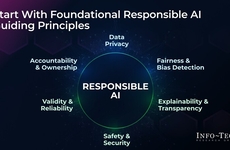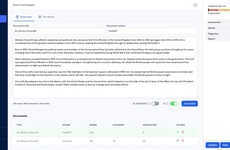
CNET Outlined how it Intends to Balance the Ethical Use of AI on its Site
Colin Smith — August 9, 2023 — Tech
References: cnet
CNET, a leading technology news and reviews website, has recently published its AI policy, which outlines how it will use artificial intelligence to assist its journalism. The policy states that CNET’s in-house AI engine, called Responsible AI Machine Partner (RAMP), will help the editors and writers with tasks such as organizing data, creating outlines, and generating explanatory content. However, the policy also emphasizes that no stories will be entirely written by RAMP, and that human experts will always review, fact-check, and add value to the AI-generated content.
The AI policy also addresses some of the ethical concerns that may arise from using AI in journalism. CNET promises to be transparent about its process and results, and to deploy RAMP in smart and ethical ways. The policy includes two tenets: one, every piece of content published by CNET is factual and original, whether it is created by a human alone or assisted by RAMP; and two, creators are always credited for their work. CNET also says that it has a working group of staffers who regularly meet to collaborate on principles that establish how they work with new and emerging tools.
Image Credit: CNET
The AI policy also addresses some of the ethical concerns that may arise from using AI in journalism. CNET promises to be transparent about its process and results, and to deploy RAMP in smart and ethical ways. The policy includes two tenets: one, every piece of content published by CNET is factual and original, whether it is created by a human alone or assisted by RAMP; and two, creators are always credited for their work. CNET also says that it has a working group of staffers who regularly meet to collaborate on principles that establish how they work with new and emerging tools.
Image Credit: CNET
Trend Themes
1. Transparency in AI Journalism - CNET's AI policy emphasizes transparency in its use of AI technology for journalism, ensuring that every piece of content published is factual and original.
2. AI-assisted Content Creation - CNET's in-house AI engine, RAMP, assists editors and writers with data organization, content outlining, and generating explanatory content.
3. Human-centric AI Collaboration - CNET's policy ensures that human experts always review, fact-check, and add value to AI-generated content, promoting a collaborative approach between humans and AI.
Industry Implications
1. Journalism and Media - CNET's AI policy sets the stage for disruptive innovation opportunities in journalism and media, where AI can enhance content creation and transparency.
2. Artificial Intelligence - CNET's transparent and responsible use of AI in journalism showcases the potential for disruptive innovation within the artificial intelligence industry.
3. Technology and Publishing - CNET's AI policy opens avenues for disruptive innovation at the intersection of technology and publishing, enabling more efficient and collaborative content creation processes.
4
Score
Popularity
Activity
Freshness























